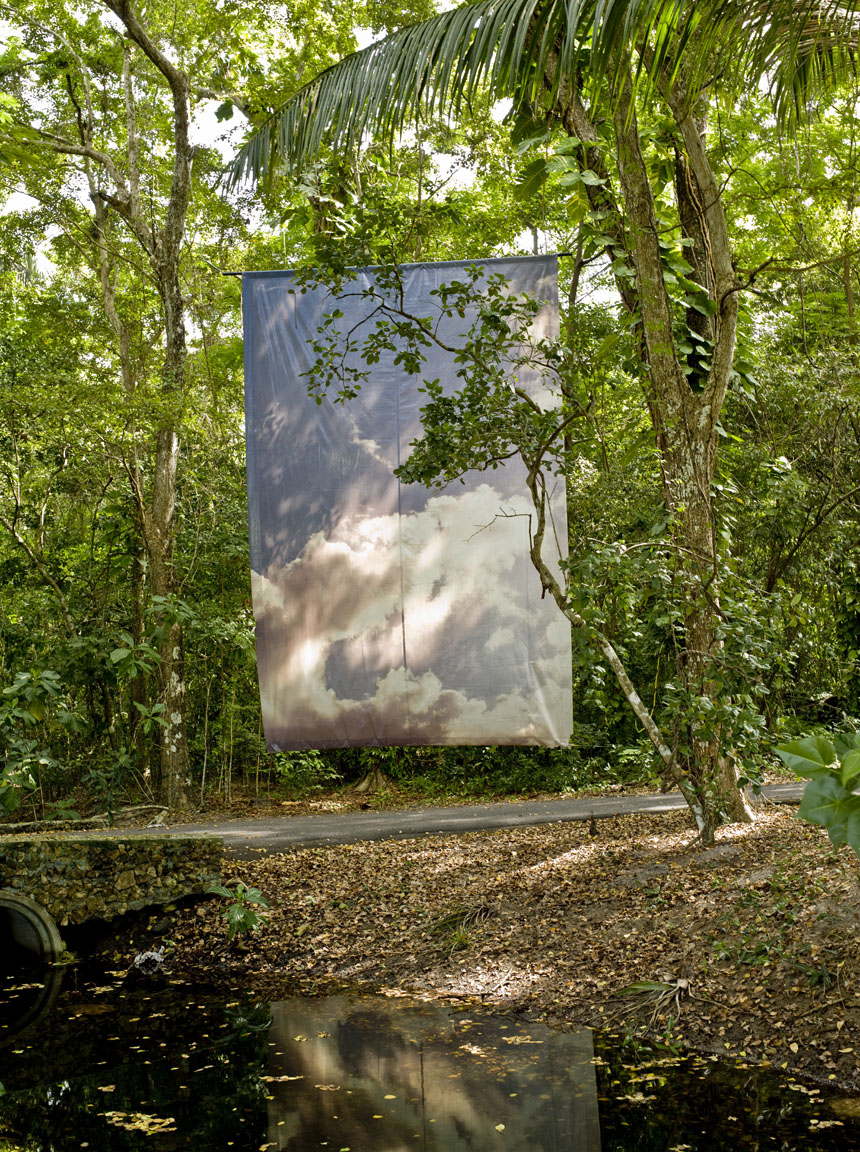In the Rough
“It is somewhat an uncanny experience to witness the fiction of nature, within itself. I guess contradictions are the only truthful way of speaking now-a-days”
– Quintín Rivera Toro
Inherited from the classical Greek tradition, 17th century artists such as Annibale Carracci, Claude Lorrain, and Nicolas Poussin developed the concept of ideal landscape. By following this canon, the elements of nature were carefully arranged on the pictorial composition in order to create an environment ruled by an atmosphere of harmony, balance, and timelessness.
The installation, Un Espacio Libre, by Puerto Rican artist Quintín Rivera-Toro, was located at the Pterocarpus Officinalis natural reserve at Dorado Beach. The artwork could be understood as an actualization of the landscape conception. Un Espacio Libre consists of a photographic series at a monumental scale depicting clouds over immense blue skies. The images were primitively conceived and installed in the urban milieu of Quintín’s natal city, Caguas, P.R., as a critique toward visual contamination, usually generated by the surplus of signs and billboard advertising. The series was placed in public spaces designated originally for advertising purposes, offering the audience a visual relief from the endless publicity that calls every day to ones attention. In this first presentation, the artwork had the intention of creating awareness of the image that should be part of the daily life but instead has been effaced because of how inaccessible it has become to get in contact with, for there is almost no chance to observe the sky as one transits the city inside an automobile among endless rows of buildings. The artwork by Rivera-Toro was an active proposal to sketch new ways that inhabit and design the urban space.
Nevertheless, inside the Pterocarpus Officinalis reserve at Dorado Beach the meaning of Un Espacio Libre was transformed. Located near the artworks of other artists that have dealt with the sensorial effect of large-scale art objects over the public, the work grew to be remarkable and strongly relevant to the land art tradition that commenced at the second half of the twentieth century. In Land Art the artwork becomes an element of the landscape and vice-versa; a symbiotic process that provides one with an intense aesthetic experience.
In order to have had a fulfilled and effective experience of Un Espacio Libre, one had to walk through the trails of the grove allowing the images and the scale of the surrounding objects to surprise while the notion of the ideal landscape became palpable. What originally was conceived as a bi-dimensional experience later developed into a redesign, tridimensional, and multisensory one that made possible to enjoyment the fauna, the sea breeze, the saltpeter, the sand, and the sky simultaneously through the photographic windows among the trees. The journey would end as soon as the forest was left behind introducing one’s eyesight to the sea and the sky.
Each natural and man-made element represented in a perfectly balanced proportion lead one to a moment of harmony and plenitude. Un Espacio Libre may be defined as the encounter of distant landscapes that give out the inviting sensation to walk through. Quintín Rivera-Toro’s work provides not only a social critique to media but also an opportunity to bring the audience closer to that which is most admired; the vastness of nature and the sky.



